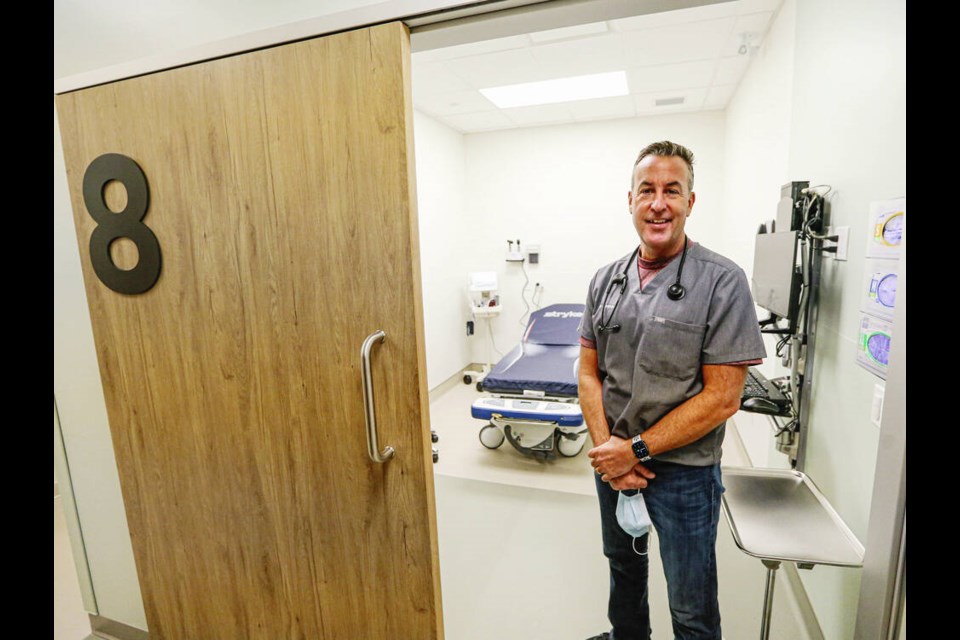Esquimalt’s new urgent and primary care centre opened Monday with a newly hired doctor.
Dr. Alec Walton, 55, who previously worked as a family doctor and a hospitalist, was on site Monday to see patients in need of urgent care.
“This is the best job I’ve had in 30 years,” said Walton. “It works well, it pays well, you’re well supported for a whole bunch of different reasons.”
The Esquimalt clinic has been in a temporary location since it was announced in June. It is the fifth UPCC on the Island and one of 26 in the province. Located in three units of a strip mall at 890 Esquimalt Rd., it offers same-day urgent care for patients from Esquimalt and neighbouring View Royal.
The clinic is open daily from 8 a.m. to 8 p.m. by drop-in and scheduled appointments. It’s eventually expected to have three doctors or nurse practitioners as well as three registered nurses, three medical office assistants, a mental-health and substance-use consultant and a social worker. Currently, it has just one full-time physician — Walton.
Once the Esquimalt UPCC is “fully operational,” patients without a regular doctor or nurse practitioner should be able to be attached to a primary care provider on an ongoing basis.
Starting at 8 a.m. each day, people can call to secure an urgent-care appointment. If it’s busy, appointments will be prioritized based on urgency. Those who don’t have phone access can turn up in person after 8:30 a.m., and will be added to the registration queue when they arrive.
The new 3,700-square-foot facility has a large reception area, a procedure room for minor stitches, biopsies and diagnostic tests, an ear-nose-and-throat exam room, a mental health and addictions office, four primary-care exam rooms, and an isolation room with a donning and doffing area for staff and a separate outdoor entrance for patients.
Beth-Ann Parmar, manager of the North Quadra UPCC, said her clinic’s isolation room for suspected infectious diseases has been used “quite a bit” during the pandemic.
Rachel Spanier, the mental-health and substance-use consultant, said the wait for care at the clinic, which offers short-term counselling and therapy, is often about a week. “We do what we can to help people until they can get into a higher service” or another community resource.
On Monday, Walton was in a “collaboration room” at the back of the building, kiosks where doctors, nurses and other health-care professionals with expertise in a wide variety of areas work together.
Patients benefit from that team-based approach, said Walton. “It’s kind of an all in one … with a whole team involved, it’s easier to access resources,” he said.
Walton, who is paid a salary by the health authority, maintains UPCCs are ideal for new doctors who want to try out a family practice and take on patients without the financial overhead involved in buying into a practice.
Denise Blackwell, chairperson of the Capital Regional Hospital District, called the facility beautiful and bright and said Esquimalt is in great need of physicians. “They almost had none about a year ago,” said Blackwell.
The Capital Regional Hospital District contributed 30 per cent — about $833,000 — to the capital costs of the clinic. The annual operating costs are separate, paid for by the health authority via the province. Those figures were not available Monday.
Until now, Esquimalt residents have been served by a temporary location that has operated out of the township’s public health unit at 530 Fraser St.
It offered limited health-care services by two registered nurses, a mental-health and substance-use consultant, and two office staff weekdays from 8:30 a.m. to 3:30 p.m.
The closing of the Esquimalt Treatment Centre in 2018 and the loss of the Westside Integrated Health Centre in Vic West in 2015 left the area with a single walk-in clinic, exacerbating a family-doctor shortage being experienced throughout the province.
An independent medical-needs assessment by Pepler Consulting Group in May 2019 pegged the number of Esquimalt residents without a primary-care practitioner at between 6,500 and 7,000. About 17,650 people live in the township.
The province pegs the number of patients in the township who don’t have a family physician at 3,500, or 18.7 per cent of the population — slightly above the provincewide rate of 17.7 per cent.
Registered nurses Anne Drost and Ali MacLaggan have been holding down the fort since June, working out of the temporary site and seeing approximately 20 to 30 patients a day. The pair have a certified practice designation, which allows them to write prescriptions for antibiotics for various infections or give gynecological exams.
Drost said the temporary clinic was a unique opportunity to showcase “the broad scope of nursing work” and hopes the pair will continue to be able to work in that expanded role.
“I think there’s a lot nurses can do to address primary health-care gaps,” she said. “I think there’s room for a change in the model.”
The first UPCC on the Island has seen about 60,000 visits since it opened in Langford in 2018. Others are in Nanaimo, James Bay and North Quadra.
Due to flooding following the Nov. 14-15 storm, the North Quadra staff is temporarily operating out of the Esquimalt location.
Esquimalt MLA Mitzi Dean-Metchosin said having a multi-disciplinary team serve Esquimalt residents is great news.
“We’ve been waiting for services to come to our community for so long,” said Dean. “It’s a really wonderful model.”
UPCCs have been criticized, however, for simply replacing existing family-practice walk-in clinics. As well, critics argue that episodic care is more expensive than traditional primary care, where a practitioner can prevent, detect and treat medical issues before they become urgent.



